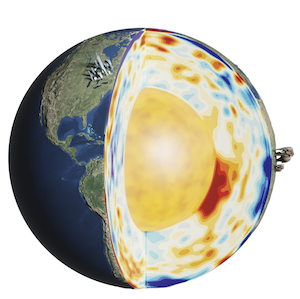Research opportunities
Opportunities for PhD studies are generally advertised in December for a start in the next academic year, with the application deadlines typically in January. Applications are primarily invited through the Oxford ILESLA DLA or the Intelligent Earth CDT.
Researchers looking for postdoctoral opportunities should get in touch to discuss project ideas and funding opportunities. I have ample experience with fellowship and funding applications and can provide advice. It is wise to start discussions early (a year or more in advance) due to funder deadlines.
Undergraduate or other students, looking for a MSc project or a short-term research experience in seismology, please get in touch with me and we can discuss possible projects.
Research interests
Seismic waves arise from a range of sources, including natural events such as earthquakes, landslides and volcanic eruptions, making them useful to study natural hazards as well as Earth structure and dynamics. Seismic signals are also generated by human and animal activities, informing us about their behaviour and linking seismology to social science and zoology.

Most of my research has focused on the Earth's deep interior, where intriguing landscapes can be found, that reflect the complex processes at work since the formation of our planet. To image these landscapes, surface recordings of seismic waves generated by earthquakes are combined using techniques similar to those in medical CT imaging. These images allow us to answer fundamental questions about Earth's interior, such as: How has the Earth evolved to its present day state? Does the Earth's mantle behave more like a boiling pan of water, heated by the core and cooled at the surface, or more like a gigantic lava lamp due to large-scale compositional variations? These questions are important as they inform us about dynamic processes within the Earth that are relevant for its habitability and help us to understand how the evolution of the Earth differs from other planets in our solar system. We investigate these questions by combining seismological findings with the results from geodynamical models and insights from mineral physics, with the aim to unravel the long-term evolution and inner workings of our planet.
Within the DEEPSCAPE research group, we also work on a variety of other projects, some involve practical deployments of sensors, others involve more theoretical work on inference methods. One overarching theme is the importance of uncertainty characterisation, both in seismic data and in seismic models.
Research funding
 LeNS UK: Large N Seismology for the UK science community
LeNS UK: Large N Seismology for the UK science community
NERC Capital grant, led by PI Nick Rawlinson (2025 - 2028)
 Mid Mantle Mysteries
Mid Mantle Mysteries
Royal Society URF renewal (2025 - 2028)
 Enhanced Research Expenses for URF
Enhanced Research Expenses for URF
Royal Society (2023 - 2025)
 What makes a city move?
What makes a city move?
Royal Society Research Grant (2022 - 2023)
 Enhanced Research Expenses for URF
Enhanced Research Expenses for URF
Royal Society (2021 - 2023)
 Seismic noise sources and background seismicity in London
Seismic noise sources and background seismicity in London
Philip Leverhulme Prize, Leverhulme Trust (2022 - 2025)
 Mantle Circulation Constrained (MC2): A multidisciplinary 4D Earth framework for understanding mantle upwellings
Mantle Circulation Constrained (MC2): A multidisciplinary 4D Earth framework for understanding mantle upwellings
NERC Large Grant, led by PI Huw Davies (2020 - 2024)
 Robust characterisation of large-scale flow in the deep mantle
Robust characterisation of large-scale flow in the deep mantle
Royal Society Enhancement Award (2018 - 2021)
 Mapping seismological landscapes in the deep Earth
Mapping seismological landscapes in the deep Earth
Royal Society University Research Fellowship (2018 - 2025)
 Multi-scale imaging of the core-mantle boundary topography
Multi-scale imaging of the core-mantle boundary topography
Junior Research Fellowship, University College Oxford (2015 - 2018)
 Imaging the Earth across the scales
Imaging the Earth across the scales
ETH Zurich Postdoctoral Fellowship (2014 - 2016)
 Nahum Scholarship in Physics & Graduate Studentship
Nahum Scholarship in Physics & Graduate Studentship
Pembroke College Cambridge (2010 - 2014)
 System Earth Modelling Scholarship
System Earth Modelling Scholarship
Utrecht University (2008 - 2010)
Recent collaborators
- Harriet Lau, University of California, Berkeley
- Barbara Romanowicz, University of California, Berkeley
- Mark Hoggard, Australian National University
- Fred Richards, Imperial College London
- Stephen Stackhouse, University of Leeds
- Hauke Marquardt, University of Oxford
- Christophe Zaroli, EOST Strasbourg
- Sophie Lambotte, EOST Strasbourg
- Carlos Chaves, University of Sao Paulo
- Rhodri Davies, Australian National University
- Bernhard Schuberth, LMU Munich
- Jeroen Ritsema, University of Michigan
- Arwen Deuss, Utrecht University